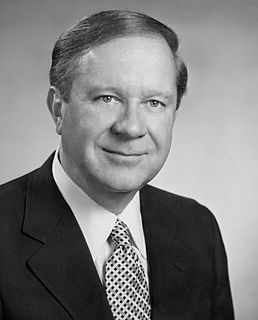A Quote by Russell B. Long
There are but three political-economic roads from which we can choose... We could take the first course and further exacerbate the already concentrated ownership of productive capital in the American economy. Or we could join the rest of the world by taking the second path, that of nationalization. Or we can take the third road, establishing policies to diffuse capital ownership broadly, so that many individuals, particularly workers, can participate as owners of industrial capital. The choice is ours.
Quote Topics
American
American Economy
Capital
Choice
Choose
Concentrated
Could
Course
Diffuse
Economic
Economy
Establishing
First
Further
Individuals
Industrial
Join
Many
Ours
Owners
Ownership
Participate
Particularly
Path
Policies
Political
Productive
Rest
Road
Roads
Second
Take
Taking
Third
Three
Which
Workers
World
Related Quotes
The financial doctrines so zealously followed by American companies might help optimize capital when it is scarce. But capital is abundant. If we are to see our economy really grow, we need to encourage migratory capital to become productive capital - capital invested for the long-term in empowering innovations.
The purpose of finance is to enable business to acquire the ownership of capital instruments before it has saved the funds to buy and pay for them. The logic used by business in investing is things that will pay for themselves is not today available to the 95% born without capital. Most of us owe instead of own. And the less the economy needs our labor, the less able we are to "save" our way to capital ownership.
Thus, the capital owner is not a parasite or a rentier but a worker - a capital worker. A distinction between labor work and capital work suggests the lines along which we could develop economic institutions capable of dealing with increasingly capital-intensive production, as our present institutions cannot.
On the basis of his work each person is fully entitled to consider himself a part owner of the great workbench at which he is working with everyone else. A way toward that goal could be found by associating labor with the ownership of capital joint ownership of the means of work, sharing by the workers in the management and/or profits of businesses, so-called shareholding by labor, etc.
The path the capitalist revolution will take faces in exactly the opposite direction from that taken by the communist revolution. It seeks to diffuse the private ownership of capital instead of abolishing it entirely. It seeks to make all men capitalists instead of preventing anyone from being a capitalist by making the State the only capitalist.
If, for example, each of us had the same share of capital in the national total capital, then if the share of capital goes up it's not a problem, because you get as much as I do. The problem is that capital in capitalist countries is very heavily concentrated, especially financial capital. So then if the share of income from that source goes up, that actually exacerbates inequality.
Throughout the industrial era, economists considered manufactured capital - money, factories, etc. - the principal factor in industrial production, and perceived natural capital as a marginal contributor. The exclusion of natural capital from balance sheets was an understandable omission. There was so much of it, it didn't seem worth counting.





























